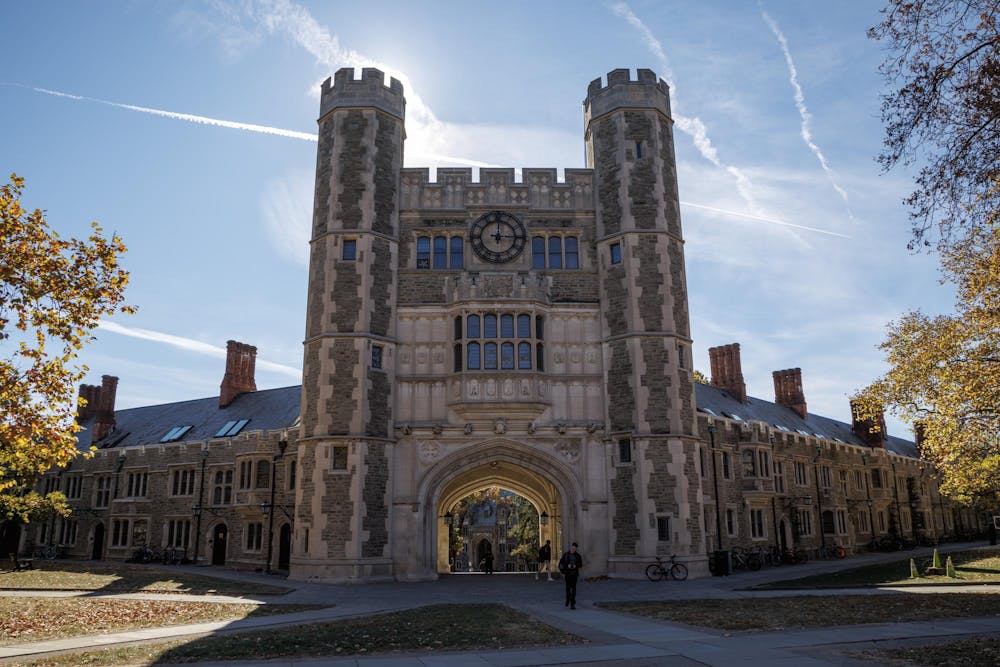Princeton released its fourth annual diversity, equity, and inclusion (DEI) report on Thursday, Jan. 30. The report, which covers the 2023–24 academic year, includes new data on the University’s DEI programming, partnerships with Native American and Indigenous initiatives, outreach to transfer and veteran students, and the fostering of belonging across faith-based identities.
The report’s release comes amid the latest onslaught of anti-DEI policies from the new presidential administration. In recent years, DEI has been scrutinized by politicians nationwide, who contend that it threatens merit-based hiring and admissions practices. On Jan. 22, an executive order equated DEI with “discrimination” and terminated DEI programs in the federal government.
The executive order states that “many corporations and universities use DEI as an excuse for biased and unlawful employment practices and illegal admissions preferences.” It calls on the attorney general and secretary of education to provide guidance on the steps necessary to comply with the Supreme Court’s ruling in Students for Fair Admissions v. Harvard, which ended race-based affirmative action in June 2023.
In the introduction to the University’s DEI report this year, President Christopher Eisgruber ’83 affirmed that Princetonians have supported “inclusion and excellence, equality and free speech — even amid a national movement to drive a wedge between these ideals.”
“The excellence of America’s leading research universities, including Princeton, depends not only on attracting talented people from all backgrounds but also on ensuring that they can thrive on our campuses,” he wrote.
The DEI report is split into four sections: climate, inclusion, and equity; academic experience; access and outreach; and demographic and climate data. The Daily Princetonian broke down the updates in each category.
Climate, inclusion and equity
The first section of the DEI report discussed campus programming and resources. New roles were added to the University administration, including the assistant vice president for diversity position and graduate student representatives for each of the Graduate School’s four governing subcommittees: policy, curriculum, fellowships, and student life and discipline.
The report also emphasizes continued commitment to improving accessibility on campus, in part through an interactive map with accessibility guides for 212 campus buildings. The map and guides were created after an accessibility survey of campus in Fall 2023 in partnership with AccessAble.
“Princeton is the first higher education institution in the nation to have such comprehensive access guides,” the report states.
The report also highlighted LGBTQ+ life on campus, including the third celebration of PrideFest, which was attended by over 500 students, faculty, staff, community members, and alumni. University Health Services earned the 2024 “LGBTQ+ Healthcare Equality Leader” designation from the Human Rights Campaign foundation.
Regarding religious life, the report describes that Institutional Equity and Diversity organized a Jewish Experience Working Group, which collected feedback about the Jewish experience campus through focus groups with students, faculty, and staff members. The Office of Religious Life (ORL), Muslim Life Program, and Muslim Student Association (MSA) also collaborated to improve access to halal meals and prayer spaces during Ramadan.

As in previous years, the report discusses naming and iconography on campus. In continued discussions about the John Witherspoon statue on campus, the Council of the Princeton University Community (CPUC) Committee on Naming hosted a symposium about memorialization, monuments, and public sites. In October 2024, the Princeton University Board of Trustees announced that the statue would remain on campus, following a lengthy evaluation process.
Academic Experience
The second section of the report outlined various national and international collaborations, which expanded Princeton’s academic offerings.
In particular, the report highlights efforts to expand the University’s relationships with Native American and Indigenous communities and tribal nations. The report states that in 2024, an administrative working group focused on Native and Indigenous experiences visited peer institutions to strengthen teaching on these topics.
These efforts build on years of advocacy. In 2020, Princeton had the least academic, institutional, and social support for Indigenous students compared with all other Ivy League schools. While Princeton does not have an official academic program for Native and Indigenous studies, course offerings in the subject have significantly increased with the addition of many Indigenous professors.
In 2024, J. Kēhaulani Kauanui joined Princeton as the inaugural Eric and Wendy Schmidt Professor of Indigenous Studies, a position first announced in 2020.
Additionally, in 2023, the University dedicated a memorial garden and historical marker “in honor of the University’s enduring relationship with the original Lenape inhabitants of the land where Princeton stands today.”
The report also highlights other faculty initiatives. The Princeton Alliance for Collaborative Research and Innovation funded 20 research projects between Princeton faculty and collaborators at Historically Black Colleges and Universities (HBCUs). In addition, the Africa World Initiative continued its lecture series and hosted the Chinua Achebe Symposium, a gathering of experts, policymakers, and stakeholders to address key issues impacting the African continent.
Access and outreach
The third section of the report discussed accessibility and outreach efforts, especially regarding programs between the University and N.J. community colleges and transfer student programs.
In 2022, Princeton announced a commitment to increasing the enrollment of students from community colleges and military backgrounds. In Fall 2024, 36 transfer students matriculated, up from 10 to 15 transfer students in 2018 through 2022. Twenty-three of the transfer students who matriculated in Fall 2024 had served in the U.S. military.
Like the 2023 report, the report highlighted the Transfer Scholars Initiative, a summer academic program which hosted nearly 70 students from eight N.J. community colleges last year. The report also mentions the establishment of the Program for Community College Engagement at the McGraw Center for Teaching and Learning to “coordinate campus-wide efforts with community colleges.”
Demographic and climate data
The report broke down demographic data collected annually from students, faculty, and staff.
As in previous years, the data section of the report includes demographic information regarding race, ethnicity, and gender identity. The report also considers citizenship, Pell Grant Eligibility, and campus community members registered with the Office of Disability Services (ODS).
The DEI report showed that the percentage of undergraduates who are international students or temporary U.S. residents has not changed significantly over the years, remaining at approximately 13 percent, while the percentage of international master’s students has increased from 30 percent in 2021 to 42 percent. The number of international doctoral students has increased by three percentage points from 42 to 45 percent since 2020.
Additionally, the section includes responses to campus-wide surveys regarding University climate and belonging.
One section of the report focuses specifically on questions of campus climate related to faith-based identities.
“The data also show that students feel a strong sense of belonging on campus across faith-based identities, with Jewish students reporting the highest sense of belonging across faith groups in 2024, despite increases in unwelcome behavior,” the report stated.
Eisgruber echoed this statement in his annual State of the University letter published on Jan. 29. “Princeton’s Jewish students report some of the highest levels of belonging of any group on the campus. That was true even during the protest-filled months of 2023–24,” he wrote.
In 2024, additional questions were added to the climate data section to gauge the degree to which students felt “intimidated” by “unwelcome behavior,” noting that “student protests and demonstrations disrupted the typical rhythm of the academic year.”
The report noted that both Jewish and Muslim students “reported a higher rate of unwelcome conduct” and “bias concerns” than in the previous year. Most reported student concerns regarded anonymous graffiti, offensive visual images, social media exchanges, or chants at protests, the report explained.
The report concluded with a message from Vice Provost for Institutional Equity and Diversity Michele Minter and Associate Provost for Institutional Diversity and Inclusion Shawn Maxam.
The message states that in the coming academic year, Princeton will conduct an external review of the University’s diversity, equity, inclusion and access program, and continue its use of working groups to “enhance campus climate and address community concerns” related to the “Jewish experience, Transgender and Non-Binary experience, Native American and Indigenous experience and Muslim experience.”
Elisabeth Stewart is a senior News writer and assistant News editor emeritus for the ‘Prince.’ She typically covers religious life, student identity and campus life, and eating clubs and co-ops.
Please send any corrections to corrections[at]dailyprincetonian.com








